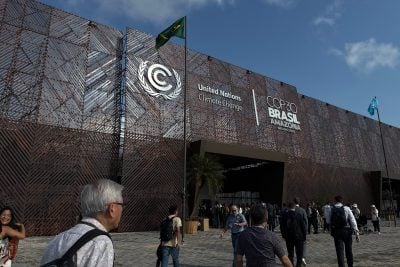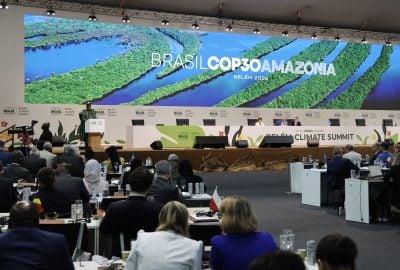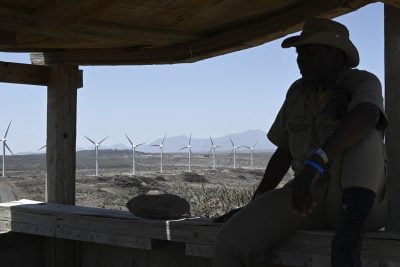“Today we agreed… to phase out and rationalize over the medium term inefficient fossil fuel subsidies while providing targeted support for the poorest.”
No, that’s not a quotation from the new “Glasgow Climate Pact” agreed at the climate summit last month, but an agreement in 2009 – 12 years ago – by the G20 – a club of the world’s wealthiest countries.
At the time the G20 text was agreed, momentum was building for a transformational climate summit in Copenhagen. Three years prior, the Stern Review, which I co-authored, had carefully upended the thinking that the costs of action were too high.
Others, for the first time, had estimated the finance that might be needed to help poorer countries respond to climate change, contributing to a game-changing call in 2009 by then UK prime minister Gordon Brown for a $100bn climate finance goal for developed countries by 2020.
Nevertheless, the Copenhagen summit ended with disagreements, and blame was variously assigned to China, India, US and Europe, just as has happened in the aftermath of Cop26 in Glasgow.
But the reason I bring up the fossil fuel subsidies paragraph is not to celebrate its new inclusion in the Glasgow text, but to reflect on why it took 12 years for an agreement by wealthy countries to be included in a UN agreement, despite the fact that the wealthiest countries are the worst offenders in this regard.
Severe lack of progress
In particular, the issue is what this severe lack of progress means for African countries.
Yes, there were other emissions-related agreements made in Glasgow – new net zero commitments in particular from India and a few others, a brand-new commitment to phase out coal, to list a few.
The official analysis is that all of these commitments plus the 12-year-old fossil fuel agreement – if met – could limit to global warming to 1.8C above pre-industrial levels. Not as strong as the 1.5C agreed in principle in the Paris Agreement in 2015, but better than the 2.4C predicted prior to the summit.
The problem is that broad net zero commitments are too amorphous. Many commentators have written about the multidimensional transformation the world has to see in order to deliver 1.5C.
There are models. These include changes such as a complete shift out of diesel and petroleum in the global transport sector, to the use of green hydrogen by all steel and cement plants, to complete closure of all coal-fired power stations, and more.
These are measurable, trackable, and possible to call out in global negotiations and domestic elections if not achieved.
That is much harder for a broad emissions reductions target. Governments in Canada, Japan, New Zealand and Russia can testify – by 2012 they had withdrawn from or reneged on the first agreement on the reduction of greenhouse gases, the Kyoto Protocol, with few domestic or international consequences. The US never formally joined Kyoto.
And in Glasgow, when it came to missing the $100bn climate goal, developed countries again said “We will try”.
Transformation is urgent
The problem is that – for Africans – trying isn’t good enough.
It’s not just about impacts and adaptation costs at higher warming levels, nor about allowing African countries to continue to use oil and gas for a while – the subject of several African op-eds in the lead up to Cop26.
It is about really understanding that the structural transformation of sectors above is urgent and cannot take another 12 years to be negotiated like the fossil fuel subsidies commitment.
By 2050, with the rollout of the African Continental Free Trade Area (AfCFTA), “Made in Africa” should be the label dominating African and world markets – not “Made in China”.
But this will not happen if we are still transporting our goods using diesel or petrol vehicles. It will not happen if we still have 600m people without electricity and, by extension, stable internet access.
Just getting to China’s current levels of manufacturing implies an almost 15 times increase in African manufacturing. We need the spillovers in terms of reduced costs from massive global and domestic investment in solar, wind and other renewable energy.
But Africa has not yet seen this benefit – the continent accounts for just 2% of global renewables production, versus 8% of hydrocarbon production.
Had fossil fuel subsidies globally been cut 12 years ago, perhaps it would be the other way around by now. We need to see the US shift away from oil and gas use and investment as much as we need to see China stop coal use and investment.
For Africans, the location of reduction is inconsequential – but the technological shift is everything.
The problem is that often, both global and African leaders are hugely unambitious. Many non-African climate activists and advisors are too – many envision our societies remaining agricultural and conflict-ridden. That cannot be our future, even if it is the present reality for many.
This is why, if anything, a side agreement to subsidise South Africa to transition away from coal is perhaps the only significant positive to come out of Cop26 for Africa. It is specific and measurable, although it will be tough.
As Africans look towards Cop27 – which will take place in sunny Sharm El-Sheikh, Egypt, my hope is that our negotiators will not be arguing over a 2009-agreed text, but instead pushing far a more detailed, measurable text, based on ambitious African development scenarios, for both the continent’s and the world’s sake.
Hannah Ryder is the CEO of Development Reimagined, a pioneering African-led international consultancy based in China.
She was named by our sister publication New African as one of its 100 Most Influential Africans of 2021.
Want to continue reading? Subscribe today.
You've read all your free articles for this month! Subscribe now to enjoy full access to our content.
Digital Monthly
£8.00 / month
Receive full unlimited access to our articles, opinions, podcasts and more.
Digital Yearly
£70.00 / year
Our best value offer - save £26 and gain access to all of our digital content for an entire year!
 Sign in with Google
Sign in with Google 



